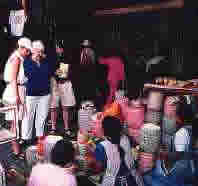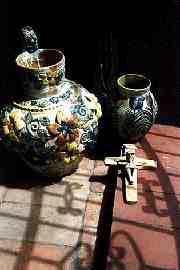In 1990, Protestants
represented 4.2 percent of the 84 million Mexicans over the age
of 5. In 2000, the figure had jumped to 7.3 percent, according
to Mexico's census bureau.
While Mexico's constitution
guarantees freedom of religion, that right is rarely enforced,
analysts say. Instead, converts find themselves forced off communal
lands, many of which are controlled by Catholic community leaders.
In Hidalgo, a big
wave of conversions started in the early 1990s, fueled in part
by migrant workers who had been exposed to various Christian sects
while working in the United States, and who returned home to spread
their new beliefs.
About three weeks
ago, authorities said, Catholic villagers burned down the houses
of five evangelical families in the mountain town of Huejutla.
 Evangelical
leaders here fear that the region could go the way of the state
of Chiapas, where disputes between religions have resulted in
murders and displaced communities. Those conflicts fueled the
1994 indigenous uprising in the impoverished southern state.
Evangelical
leaders here fear that the region could go the way of the state
of Chiapas, where disputes between religions have resulted in
murders and displaced communities. Those conflicts fueled the
1994 indigenous uprising in the impoverished southern state.
''This is a warning
bell for the whole region,'' said Alejandro Hidalgo, the pastor
of the Pentecostal church in Ixmiquilpan, a neighboring city where
the evangelical residents of San Nicolas attend services. He said
the evangelical community in this area has grown over the past
five years from 5,000 to 10,000 members.
He and other evangelical
leaders also blamed the federal government, now under control
of Fox's pro-Catholic National Action Party, for not doing more
to protect Protestants' rights. Fox angered many non-Catholics
and liberals when he broke with Mexico's historic secular tradition
and began his televised inaugural events by attending Catholic
Mass. Critics said the move may have emboldened more radical Catholics
to step up their campaign against Protestant conversions.
''What's worrying
is that pluralism isn't seen as something normal, particularly
in rural and indigenous communities,'' said Roberto Blancarte,
the federal government's former chief adviser on religious affairs.
He said such conflicts
may become even more common now that a controversial indigenous
rights law took effect last month, granting community leaders
more power to enforce local customs.
Although Mexico's
constitution bans religious discrimination, many leaders often
use ''tradition'' to justify excluding women and non-Catholics
from local leadership posts.
 ''They
don't understand that these customs don't take precedence over
individual rights,'' Blancarte added.
''They
don't understand that these customs don't take precedence over
individual rights,'' Blancarte added.
The San Nicolas conflict
centers mostly around a yearly festival for the town's Catholic
patron saint, an extravagant affair held in September for which
the community spends tens of thousands of dollars on fireworks,
food, and home-brewed liquor. Every year, the festival is hosted
by different residents, known as mayordomos,
who each spend as much as $7,000 on festivities.
The evangelicals have
refused to participate in the festival, which they denounce as
''pagan.'' They say their religion bars them from drinking - which
is at the heart of the festival - and from joining in Catholic
ceremonies.
Lugo, who argues that
the festival has little to do with Catholicism and everything
to do with ancient Otomi traditions, estimates that each Protestant
family in town owes $8,000 for its share of the festival. In March,
he cut off water service to 36 evangelical families who had not
paid. He also vowed to evict them from their land if they didn't
pay up by June. He has not yet carried out that threat.
The mayor is unapologetic.
He has stood his ground in a series of meetings with federal officials,
who have sought unsuccessfully to mediate the conflict.
''This is not a religious
conflict,'' he said. ''It's about being part of a community. If
they were in the majority, we would have to support them.''
Lugo's view has found
support in a radical minority of the town's 10,000 residents,
who resent what they see as the evangelicals' holier-than-thou
attitude.
''They go to the United
States as Catholics and they return evangelicals,'' said Amalia
Acosta, whose cinderblock house faces the town cemetery, where
evangelicals are not allowed to bury their dead. ''Every community
has its traditions. If they don't want to participate, they should
just go.''